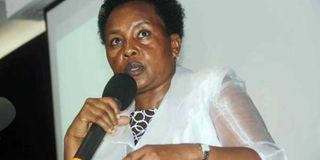Why Supreme Court delayed in JSC choice

Deputy Chief Justice Philomena Mwilu addressing delegates at the second annual legislative assemblies at Pride Inn hotel on March 21, 2017. PHOTO | FILE | NATION MEDIA GROUP
What you need to know:
- She replaces Supreme Court judge, Dr Smokin Wanjala, whose term came to an end last year.
- The Supreme Court was torn right down the middle on the subject of the retirement age of judges.
The election of deputy Chief Justice Philomena Mwilu on Wednesday to represent the Supreme Court in the Judicial Service Commission (JSC) was a culmination of a protracted exercise tracing its roots to the divisions during former Chief Justice Willy Mutunga’s time.
Justice Mwilu was elected unopposed in a poll conducted by the Independent Electoral and Boundaries Commission. She will serve for five years as a member of JSC.
“Deputy Chief Justice Philomena Mwilu is the new Supreme Court representative to the Judicial Service Commission,” the Judiciary directorate of public affairs and communication said in a letter dated May 3.
She replaces Supreme Court judge, Dr Smokin Wanjala, whose term came to an end last year. He had recused himself from the JSC last year in order to apply for the vacant position of Chief Justice following the retirement of Dr Mutunga but by the time Chief Justice David Maraga took office as chair of the JSC, his (Wanjala) own term had come to an end.
It will be the first time that both the CJ and the Deputy CJ sit on the JSC since the promulgation of the Constitution.
IEBC
The invitation to the IEBC followed three retreats by the seven Supreme Court judges at Hemingways and Windsor hotels in Nairobi as well as in Mombasa to pick its representative to the JSC. Each of the retreats had failed to arrive at a consensus on who would represent the Supreme Court at the JSC.
Eventually, the exercise that resulted in Justice Mwilu’s election took place in a room adjacent to the rarefied library of the Supreme Court in Nairobi.
With the CJ being an automatic member and chairperson of JSC, the remaining six Supreme Court judges had on several occasions failed to pick one among them through consensus as recommended by Mr Maraga.
“The Chief Justice tried to convince them to pick among themselves through consensus but this proved hard because of the ideological and personal divisions that are deep-seated,” said senior counsel Ahmednasir Abdullahi, a former JSC member.
Apart from Mr Maraga and his deputy, other members of the Supreme Court are justices Wanjala, Mohammed Ibrahim, Njoki Ndung’u, Jackton Ojwang’ and Isaac Lenaola.
RETIREMENT
The Supreme Court was torn right down the middle on the subject of the retirement age of judges during the sunset days of Dr Mutunga’s term.
The former CJ, and justices Wanjala and Ibrahim had been on the same side when they recused themselves from hearing the appeals by former Deputy CJ Kalpana Rawal and Justice Philip Tunoi on grounds that they had in the past made public their opinions regarding the retirement age of judges and were, therefore, likely to be perceived as being biased irrespective of how they decided.
On the other hand, justices Ojwang’ and Ndung’u had sided with their former colleagues Rawal and Tunoi on the retirement case. As a result of the divisions then, the appellate court’s decision on the retirement cases was left to stand.
Even after the court was partially reconstituted following the retirement of Dr Mutunga, Justice Rawal and Justice Tunoi, the divisions have not healed and according to some insiders, some of the judges hardly see eye to eye, except when they are in public.
Besides the divisions, the other reasons that led to the prolonged exercise to settle on their representative was that three of the judges, justices Ibrahim, Ojwang’ and Ndung’u had been found by the JSC to have misconducted themselves in their decision to withdraw their services from Kenyans by “imposing a moratorium on all the judicial operations” in a letter dated September 24, 2015.
REPRIMAND
Besides, Justice Ibrahim was seen by some of his colleagues “to have sold” out after he cast his lot with CJ Mutunga and Justice Wanjala to recuse themselves from the Rawal-Tunoi retirement case.
According to insiders, it was, therefore, going to be difficult for any of three to be members of the same commission that had reprimanded them.
That, therefore, left only justices Mwilu, Wanjala and Lenaola. “One of the options was to allow Dr Wanjala to go back to the JSC for continuity, but also as consolation for coming second in the CJ interviews, but some two Supreme Court judges would not hear of it,” a source said.
Meanwhile, Justice Lenaola, who previously represented the High Court at the JSC and sat in interviews to select justices Ojwang’, Ibrahim, Ndung’u, Tunoi, Rawal and Mutunga, was considered too new to the apex court to represent it.
As a result, the deputy Chief Justice was seen as the compromise candidate to represent the Supreme Court in the JSC.
Before Justice Mwilu’s election to JSC, the commission had only nine members following the resignation of Ms Winnie Guchu to join the Jubilee Party secretariat as its executive director in March this year.
The nine were CJ Maraga, Court of Appeal judge Mohamed Warsame, High Court judge Aggrey Muchelule and chief magistrate Emily Ominde, Attorney-General Githu Muigai who represents the Executive, chairperson of the Public Service Commission Margaret Kobia and presidential nominee Kipng’etich arap Korir.
Law Society of Kenya is represented by Prof Tom Ojienda and Mercy Deche. Chief Registrar, Ms Anne Amadi, is also a member, but as the commission secretary she holds no vote.





